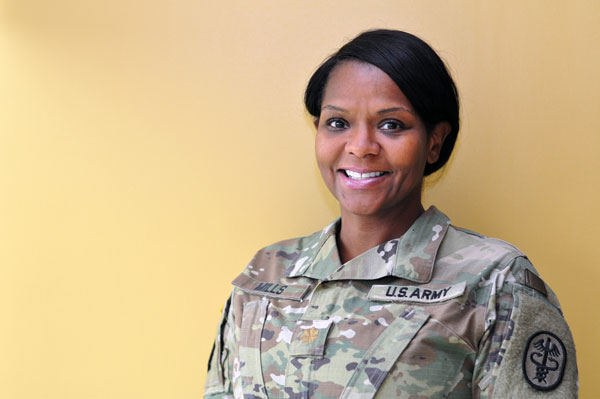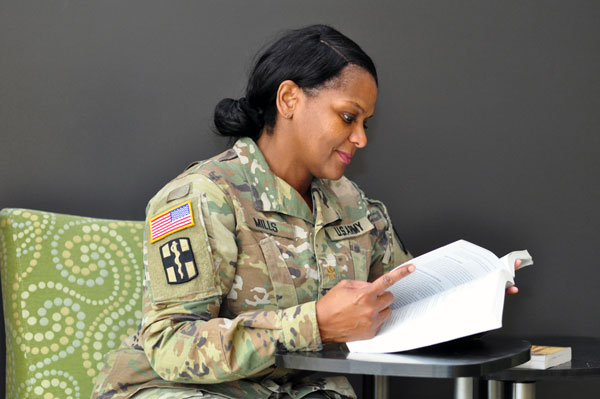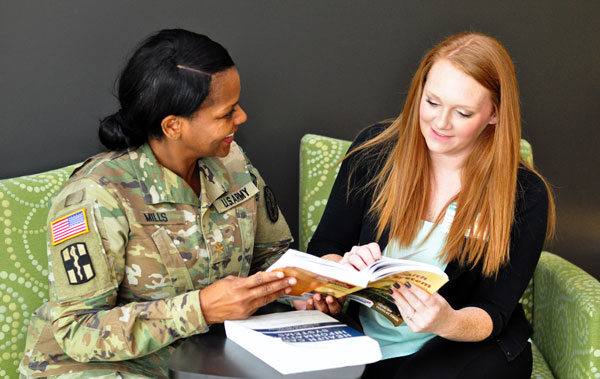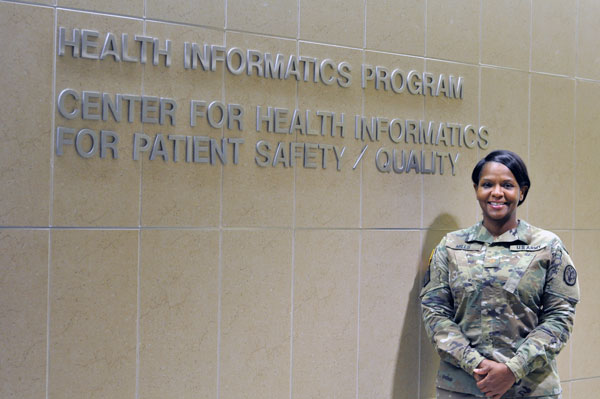Jimmedda Mills was not what you would consider a “perfect” soldier. Her childhood dreams didn’t involve wearing a uniform and deploying to far-off places. The Texas native enlisted because she was mad at her parents and wanted to get far away. She stayed for the monetary or educational benefits. It wasn’t until Mills was ready to leave the Army that she fell in love with it and found her purpose in life – to be a leader.
 The now 45-year-old UAB graduate student began her military career training as a combat signaler, but that is not the job she continued in the years ahead. She was raped by a fellow soldier during her training and that incident led her to a change of jobs. She soon became an operating room technician, which turned out to be the best thing that could have happened for her future.
The now 45-year-old UAB graduate student began her military career training as a combat signaler, but that is not the job she continued in the years ahead. She was raped by a fellow soldier during her training and that incident led her to a change of jobs. She soon became an operating room technician, which turned out to be the best thing that could have happened for her future.
“I trudged through the Army,” Mills said. “I didn’t really like it. I was homesick and missed my boyfriend.”
It didn’t help that her first official job post left her bored and ready to do anything else. She finally had the opportunity to become a licensed practical nurse and, upon graduation, she worked on the OB/GYN floor at the Fort Leonard Wood Hospital and met some amazing people, including a doctor who is still her best friend to this day. But it was on that same floor that Mills learned her mother had been murdered.
“My mom was shot and left to die,” Mills said. “I had to leave and deal with that. And I was depressed for a very long time.”
She gained weight, lost focus and was spiraling downward fast until a friend helped her find her way again. Mills got a hold of her future and went back to school to become a registered nurse. Her plan was to leave the Army once she became an RN, but another opportunity arose – this time, in Korea.
“Once I got to Korea, one of my Non-Commissioned Officers in Charge saw something in me. She told me I had just been having a good time and skating through, but I could do so much more,” Mills said. “She gave me the drive to really get involved in the Army. Up until then I had been the poster child for what you shouldn’t be as a soldier. If there was a way to get out of some kind of duty, I found it. I would do absolutely nothing except the bare minimum.”
But then Mills found her enthusiasm for the Army, and she continued to push herself and move up the ranks. Her jobs ranged from working in the ambulatory care clinic to running the combat support hospital, but it was her first post in Korea when she truly found her love for leadership.
“I was one of the Sergeant Major’s right-hand people,” she said. “He made you have pride in your job and I loved it. I loved being in charge, being a leader. I got to travel all over.”
Mills continued to re-enlist so she could stay in Korea. It was during this time that she met then Captain Nadja West, who went on to become the first black Army Surgeon General, the first black female active-duty Major General, the first black female Major General in Army Medicine and the first black female Lieutenant General in the Army. It was also in Korea that Mills met the man who eventually became her husband, although she never imagined that happening when she met him.
After a little over two years, Mills decided it was time to come back to the states. She went to her next leadership school and, following that course, she was assigned to Walter Reed Medical Center where she was the Non-Commissioned Officer in Charge of several different critical care units.
She covered the floor one day so one of her soldiers could take a lunch break.


“I go out there to check on the patient and it’s the same man who had raped me years ago,” Mills said. “I was very flabbergasted so I just walked away. I went downstairs and tried to compose myself. I thought I’d visit with another friend who worked at the cancer research center. They had a cappuccino machine and I really just wanted to have a cappuccino.”
While visiting with her friend and decompressing, Mills decided it was time she had her first mammogram.
“So they squished my breast in this machine and they found a lump,” she said. “I just wanted coffee and instead found out I had cancer.”
Mills had surgery to remove the lump and went through treatment, but she pushed through her cancer fight and continued life with the Army. The following years held many surprises for Mills – an opportunity to receive her Bachelor of Science in Nursing, realizing her dream of becoming an Army officer, marriage to a fellow soldier and a deployment to Iraq.
“I was stationed at Ibn Sina Hospital in Baghdad in the middle of the Green Zone where mortars were dropping in the distance all of the time,” she said. “It was a really heightened time. There was a lot of death. Although I volunteered to be there, I was ready to go.”
While in Iraq, interest piqued to become an ICU nurse and, upon returning to the states, she went to Walter Reed to attend the ICU course. But life had other plans. Mills discovered that not only was she pregnant, she had a uterine tumor affecting her pregnancy.
“So, I prayed and as my hormone levels went up, the tumor actually shrank,” she said. “My daughter saved my life.”
Mills did not continue in the ICU course and became a nurse case manager at the Warrior Transition Brigade where she helped wounded soldiers transition to their unit or civilian life. One of her favorite memories during this time was of a quad amputee named Staff Sergeant Travis Mills. He had lost both of his arms and legs and is now a motivational speaker and owns a rest and rehab center for wounded soldiers.
“He is just amazing. One day, I was sitting at my desk and complaining about the job and family, and he just looked at me and said, ‘You think your life’s rough, I can’t even wipe my own ass,’” she said. “It really puts your life in perspective when you are surrounded by these men and women who are amputees or have traumatic brain injuries. I never felt sorry for myself again.”
 Mills eventually was transferred from that job and continued building her leadership skills in varied positions. She finally moved into a position as a Brigade Nurse Counselor in 2016, but the question was always what comes next? The Army helped her come to a decision when it purchased a product that would allow it to merge all health care records into one system, making it the largest interoperable health care platform. Mills decided she wanted to help make that happen. She applied to the Master of Science in Health Informatics program in the School of Health Professions at UAB and was accepted.
Mills eventually was transferred from that job and continued building her leadership skills in varied positions. She finally moved into a position as a Brigade Nurse Counselor in 2016, but the question was always what comes next? The Army helped her come to a decision when it purchased a product that would allow it to merge all health care records into one system, making it the largest interoperable health care platform. Mills decided she wanted to help make that happen. She applied to the Master of Science in Health Informatics program in the School of Health Professions at UAB and was accepted.
“I chose UAB because it is an amazing program,” she said. “Plus, my husband is from Alabama.”
Her plan when she graduates in 2020 is to be a chief medical information officer at a hospital where she will help roll out the Army’s new health care platform and ensure it is working properly. Her dream is to eventually retire in Texas.
“I’ve been in the Army for 27 years, and I’ve held all but two ranks on the enlisted side and all but two ranks on the officer side, excluding General Officer. Now, if you asked me when I was younger if this is what I pictured for my life, the answer was definitely no, but the Army has helped me achieve more than anything I could have imagined,” Mills said. “The military is a great equalizer. A Captain is a Captain; a Solider is a Soldier. Everything is based on your potential and where you want to take it. Of course, I took it really slow in the beginning, but I finally caught on.”
But Mills understands that she didn’t do it alone. She only made it to this point in her life because of God’s grace and all of the people who took the time to push her to be better.
“The Army has so many great leaders and people that truly care about soldiers,” she said. “They want you to advance, they want you to take over for them so they can move on to the next position. I might have been told ‘No, not right now,’ but no one has ever tried to hold me back. The Army takes care of their family. We sacrifice a lot, but we get a lot in return.”